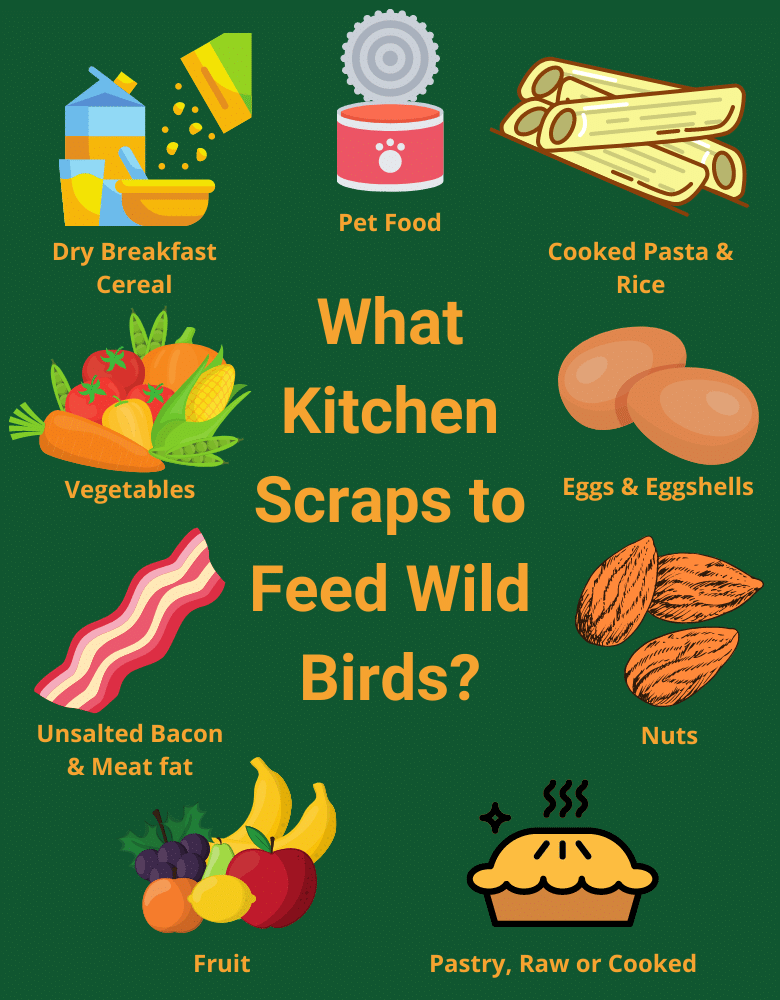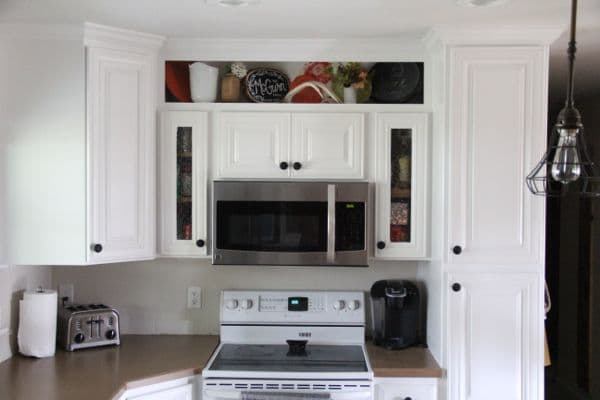Feeding birds from your kitchen can be a rewarding and enjoyable experience. With the right food choices, you can attract and feed a variety of birds. The most common kitchen bird foods include bird seeds, peanuts, sunflower seeds, suet, and mealworms. You should also make sure that the food you are feeding the birds is fresh and free of any mold or spoiled areas. Additionally, you should always make sure that the birds’ water source is clean and fresh. Providing food and water for birds can be an enjoyable hobby for people of all ages.
Safe Foods for Birds
Do you want to help out your feathered friends? If so, you can toss them a treat from your kitchen every once in a while. But, it’s important to know what you can and can’t put in your bird feeder. While some foods can be a nutritious snack for birds, others can be dangerous. To help you out, here are some safe foods that you can feed birds from your kitchen.
Fruits and vegetables are a great choice for birds, and some of the most popular ones to offer include apples, pears, grapes, sweet corn, and carrots. You can also give them cooked potatoes, oatmeal, whole-grain bread, and birdseed. Just make sure to avoid adding butter, salt, sugar, or other seasonings.
Birds also love nuts and seeds. Almonds, walnuts, sunflower seeds, and pumpkin seeds are a few of the favorites. You can also offer cooked beans, raw peanuts, and cooked pasta.
Finally, birds love suet. You can buy suet cakes at the store, or make your own. To do this, combine melted fat or lard with birdseed, oats, and cornmeal. Then pour the mixture into a container and let it cool and harden in the refrigerator.
By offering a variety of safe foods, you can make sure to keep your feathered friends happy and healthy. Just make sure to keep an eye on what they’re eating and discard any uneaten food after a few hours.
Benefits of Homemade Bird Feed
Feeding birds in your yard is an enjoyable and rewarding activity that can be done all year round. It is a great way to get closer to nature and admire the beauty of the birds up close. Additionally, homemade bird feed can be beneficial for both birds and you.
Homemade bird feed is often cheaper than store-bought bird seed, and it is easy to find ingredients to make it with. You can find a variety of ingredients in your kitchen that you may not realize are suitable for birds. For instance, nuts, seeds, and dried fruit are all great sources of energy for birds. Furthermore, bread crumbs, oatmeal, and cooked rice are also good sources of nutrition for birds.
Not only is homemade bird feed beneficial to the birds, but it also helps you save money. Making your own bird feed allows you to customize the ingredients to suit the birds in your area. With different recipes, you can also make bird feed that appeals to different species.
Making your own bird feed is also a great way to teach children about animals and the environment. It’s a fun activity that can help them learn about the birds in their area and the importance of providing them with nutritious food.
In conclusion, homemade bird feed is a great way to save money and provide birds with a nutritious meal. It is also an enjoyable activity that can help children learn about the environment and the importance of feeding birds.
Common Kitchen Ingredients to Feed Birds
Birds may not be able to vocalize their appreciation for your efforts, but they certainly enjoy a good meal! Feeding birds in your backyard is an excellent way to connect with nature and foster a sense of appreciation for the environment. For those wondering what to feed birds from the comfort of their kitchen, there are plenty of common kitchen ingredients that can be used.
From fruits and vegetables to grains and seeds, there is a wide variety of food that birds may find appetizing. Fresh fruits such as apples, grapes, and oranges are healthy and nutritious snacks for birds. Vegetables such as lettuce, spinach, and carrots make a great meal for many species of birds. Grains including oats, quinoa, and millet are also a great source of fiber and protein for birds.
Additionally, there are many types of bird-friendly seeds that can be found in the kitchen. Sunflower seeds, pumpkin seeds, and sesame seeds make a tasty treat for birds. They offer plenty of energy and are a great source of omega-3 fatty acids. Nuts including almonds, walnuts, and cashews are also a great source of nutrition for birds.
All of these foods can be used to create an enjoyable and nutritious meal for birds. Just make sure to feed them in moderation and that the food is free of any pesticides or preservatives. With a little bit of planning and creativity, you can provide birds with a delicious and nutritious meal from the comfort of your kitchen.
Making Your Own Bird Mixtures
Birds need a balanced diet to stay healthy and they love variety! One way to give them just that is to make your own bird mixtures. Making bird mixtures is a great way to use up ingredients from the kitchen that may otherwise go to waste. Plus, you can tailor the mixtures to the birds in your area. Here are some tips on how to make your own bird mixtures.
When you make your own bird mixtures, it’s important to use a variety of foods. Seeds, nuts, fruits, and vegetables all make great additions. You can also add in some mealworms and crickets for more protein. Additionally, a sprinkle of mineral powder can help provide additional nutrients.
You should also consider the size of the food you are mixing together. Larger foods, like sunflower seeds and nuts, should be broken down to smaller sizes so that smaller birds can enjoy them too. By making sure the pieces are the right size, you can be sure that all birds in your area can get the most out of your bird mixtures.
Finally, you should store your bird mixtures in an airtight container. This will help keep moisture out and ensure that the mixture stays fresh and nutritious for the birds.
Making your own bird mixtures is a great way to use up ingredients from the kitchen and provide a variety of foods for the birds in your area. With these tips in mind, you can create the perfect bird mixtures for your feathered friends.
Safety Considerations When Feeding Kitchen Ingredients
To Birds
Birds may be able to access food from a variety of sources, but when it comes to feeding them from your kitchen, there are certain safety considerations to keep in mind. Many common ingredients, such as sugar, salt, and butter, can be dangerous for birds if not served in moderation. Additionally, some foods, such as avocados, onions, and garlic, are toxic to birds. Therefore, it is important to research which foods are safe to feed to birds before offering them anything from your kitchen.
It is also important to be aware of the potential dangers of feeders. Bird feeders can sometimes attract animals such as squirrels, rats, and raccoons. This can cause a health risk to birds if these animals are carrying diseases or parasites. Additionally, feeders can also attract predatory birds such as hawks and owls. To reduce the risk of these hazards, it is important to regularly clean and maintain bird feeders.
Finally, it is important to ensure that the food you are offering is fresh. Spoiled or moldy food can cause a number of health issues in birds, so it is important to regularly inspect the food that is being offered.
By following these safety considerations, you can ensure that the birds you are feeding from your kitchen stay healthy and safe.
Kitchen Feeders for Birds
Birds are naturally attracted to our kitchens, but what can you feed them to keep them healthy and happy? While it’s important to provide birds with a variety of foods, you can also use some of the ingredients you already have in your kitchen. From insects to seeds, fruits, and vegetables, there are plenty of items you can use to create a delicious kitchen feeder for your feathered friends.
Insects are a great source of protein and many birds, such as sparrows and robins, will happily munch on them. You can attract insects by leaving small bits of cooked meat on your windowsill or in your garden. You can also add mealworms to your bird feeders to attract a variety of birds.
Seeds are a popular choice for wild birds, and you can easily find them in your kitchen cupboard. Sunflower seeds are a great way to provide birds with energy, and you can also offer them other types of seeds such as millet, buckwheat, and quinoa. You can also use a variety of nut butters to attract birds, such as peanut butter, almond butter, and cashew butter.
Fruits and vegetables are also a great way to provide birds with a nutritious meal. Apples, pears, and grapes are all popular choices, while carrots, sweet potatoes, and pumpkins are all good sources of energy. You can also offer cooked pasta, rice, and beans, which can all be a great source of protein for your birds.
By providing birds with a variety of food from your kitchen, you can create a healthy and balanced diet for them. By doing so, you’ll also be helping to keep your bird feeders clean and tidy, and providing a safe and healthy environment for your feathered friends.
Attracting Different Types of Birds
in Your Garden
Attracting different types of birds to your garden can be an exciting and rewarding experience. Watching birds flitting around your garden, taking in the sights and sounds of nature, can be a therapeutic and calming activity. But to ensure that these feathered visitors keep coming back, you need to provide them with the right type of food. Knowing what to feed birds in your garden can be a challenge, so it is important to understand which type of birds are attracted to what type of food. Different birds have different food preferences, so it is essential to provide a variety of food options to ensure that all bird species in your garden are well-fed.
Seeds, nuts, and grains are the most popular types of bird food. Sunflower seeds, black oil sunflower seeds, and peanuts are some of the most popular bird foods. Suet mixes, which are a combination of rendered fat, seeds, grains, and fruit, are also highly attractive to birds. Fruits like oranges, apples, and grapes are also popular among birds, as are mealworms, which are the larvae of the mealworm beetle. Hummingbirds prefer nectar, which can be made at home or purchased at a store.
In addition to providing food, it is important to provide a variety of bird feeders, bird baths, and bird houses. These will attract a wide variety of birds to your garden and ensure that they have a safe place to rest and feed. Be sure to keep the feeders and bird baths clean and to keep the food fresh. By providing the right type of food and shelter, you can attract a variety of birds to your garden and enjoy the delightful sights and sounds of nature.
Common Mistakes to Avoid When Feeding Kitchen Ingredients to Birds
Feeding wild birds can be a rewarding experience as many birds rely on humans for sustenance. But if you’re one of those who are planning to use kitchen ingredients to feed the birds, you should be aware of the common mistakes to avoid. It’s important to keep in mind that some kitchen ingredients can be harmful to birds, and improper feeding can lead to health issues or even death.
First and foremost, birds should never be fed human food, as many of the ingredients used in human cooking can be detrimental to their health. Foods like onions, garlic, and avocado should be avoided, as they contain toxins that can be harmful to birds. Additionally, many birds are unable to digest certain types of carbohydrates and fats, so these should be avoided. Highly-processed foods like chips, candy, and fast food should never be offered to wild birds.
It’s also critical to keep in mind that birds need to eat a balanced diet to stay healthy. While offering a variety of kitchen ingredients to birds can provide them with a good source of nutrition, it’s important to ensure that birds are getting the right balance of proteins, vitamins, and minerals. Too much of one type of food can lead to malnutrition.
Finally, it’s important to be aware of how much food you’re offering. Overfeeding birds can lead to overpopulation, which can lead to overcrowding of their habitat and the spread of diseases. Offering food in moderation is key to keeping birds healthy and safe.
By avoiding these common mistakes, you can ensure that the birds you feed from your kitchen get the proper nutrition and that you’re helping them in a safe and healthy way.
FAQs About the What Can You Feed Birds From Your Kitchen
Q1: What kind of food can I feed birds from my kitchen?
A1: Common kitchen foods that are safe for birds include cooked pasta, cooked oatmeal, cooked vegetables, cooked rice, cooked beans, cooked eggs, fresh fruits and vegetables, and unsalted nuts.
Q2: Is bread okay to feed birds from my kitchen?
A2: White bread is not a healthy option for birds. Whole wheat bread is a better option, but should be fed in moderation.
Q3: What should I avoid feeding birds from my kitchen?
A3: Avoid feeding birds from your kitchen items that are salty, sugary, or fatty. Common kitchen items that should not be fed to birds include chips, crackers, and sugary cereals.
Conclusion
In conclusion, feeding birds from your kitchen is a great way to enjoy and appreciate nature. Not only does it provide entertainment for you and your family, but it helps the birds in your area stay healthy and well-fed. With the right foods and a few simple steps, you can easily create a nutritious meal for birds in your backyard or local park. With a little bit of knowledge and effort, you can create a safe and enjoyable experience for both you and the birds.


